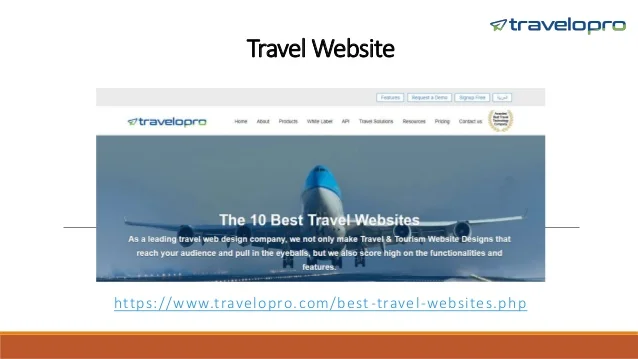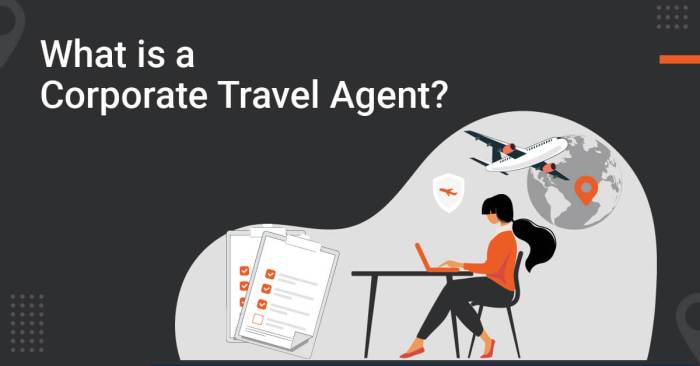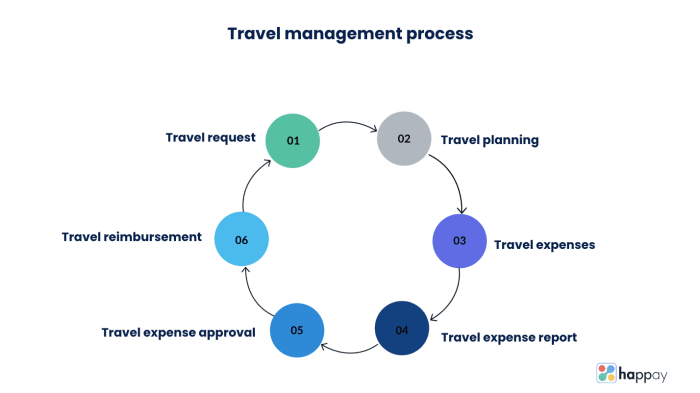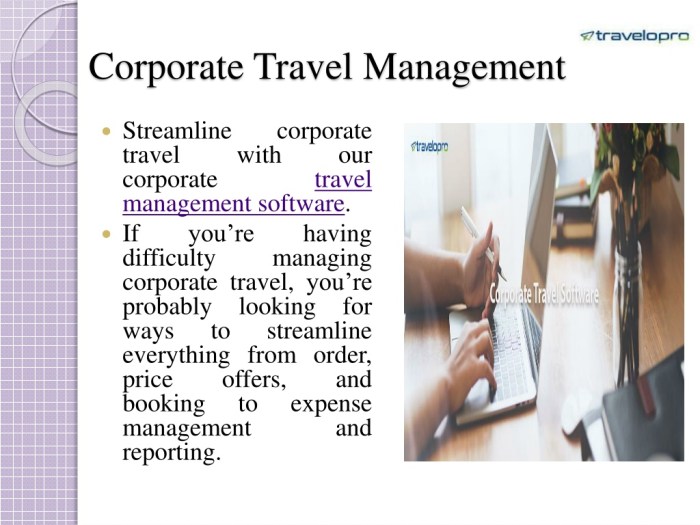Corporate Travel Sites A Comprehensive Guide
Corporate travel sites are evolving rapidly, offering more than just booking tools. This guide delves into the features, trends, and best practices surrounding these platforms, from the intricate details of expense reporting to the emerging innovations in sustainable travel options. We’ll explore how these sites cater to diverse user roles, from seasoned travel managers to individual employees.
Modern corporate travel websites are crucial for streamlining travel processes and fostering efficiency within organizations. They must offer intuitive navigation and robust security features. This document analyzes the key elements of these sites, including the specific functionalities that cater to different user roles, the significant impact of emerging trends, and the essential security measures needed to ensure smooth and safe operations. Understanding these aspects is key for businesses to optimize their travel management and gain a competitive edge.
Corporate Travel Website Features

Modern corporate travel websites are crucial for streamlining travel arrangements and managing expenses efficiently. These platforms provide a centralized hub for employees, travel managers, and administrators, enabling seamless booking, policy adherence, and communication. This allows businesses to save time and money while maintaining compliance.
Comprehensive corporate travel websites are not just for large enterprises; tailored solutions are available for businesses of all sizes. Features range from basic booking tools to sophisticated expense reporting and policy management systems, reflecting the varying needs of different organizations. A user-friendly interface is essential for intuitive navigation and adoption across all user roles.
Booking Tools
Effective booking tools are fundamental to any corporate travel website. These tools facilitate quick and easy searches for flights, hotels, and car rentals, often integrating with preferred suppliers and loyalty programs. Advanced filtering options, based on specific criteria, allow users to refine results, ensuring that the chosen travel arrangements align with company policies and preferences. Real-time updates on availability and pricing are also critical for timely decisions.
Expense Reporting
Expense reporting is a critical feature for corporate travel websites. Automated tools simplify the process of capturing and submitting receipts, while integrating with accounting systems ensures seamless expense reconciliation. These tools help reduce manual effort and ensure that expenses are properly documented and compliant with company policies. Advanced features can provide detailed reports and analyses of travel expenditures.
Policy Management
Clear and accessible policy management is essential. Websites should allow travel managers to easily create, update, and enforce company travel policies. This includes outlining rules related to booking, expenses, and communication. This feature also allows for easy dissemination of updated policies to employees. The site should also provide clear explanations and examples of policy guidelines.
Communication Channels
Effective communication is key. Websites should provide channels for communication between travel managers and employees, enabling real-time updates and support during travel. This can include features such as a help desk, FAQs, or a dedicated messaging system for travel-related queries. This fosters a smoother travel experience and reduces issues during travel.
Features and Importance for Different User Roles
| Feature | Importance for Travel Managers | Importance for Employees |
|---|---|---|
| Booking Tools | Streamlined booking process, compliance monitoring, and cost control. | Easy access to booking options, quick and efficient travel arrangements. |
| Expense Reporting | Efficient expense tracking, analysis, and reporting. | Easy submission of travel expenses, clear guidelines on policy adherence. |
| Policy Management | Centralized management of company travel policies, ensuring compliance. | Clear understanding of company travel policies, quick access to relevant information. |
| Communication Channels | Proactive communication with employees, efficient problem resolution. | Easy access to support, prompt answers to questions. |
Trends and Innovations in Corporate Travel

Corporate travel is undergoing a significant transformation, driven by evolving employee expectations, environmental concerns, and technological advancements. Companies are increasingly recognizing the need to optimize travel programs, balancing cost-effectiveness with employee satisfaction and sustainability. This evolution is reflected in the innovative design and functionality of modern corporate travel websites.
The landscape of corporate travel is being reshaped by a confluence of factors. Sustainability is becoming a paramount concern for businesses and employees alike, impacting the choices made for travel options. Dynamic pricing models are being implemented to ensure optimal cost management, while artificial intelligence is revolutionizing the way travel arrangements are made. These trends are directly impacting the design and functionality of corporate travel websites, moving them beyond simple booking platforms to comprehensive travel management systems.
Sustainable Travel Options, Corporate travel sites
Companies are increasingly seeking eco-friendly travel options. This includes prioritizing transportation methods with lower carbon footprints, such as trains or electric vehicles. Businesses are also supporting accommodations that adhere to sustainable practices. Corporate travel websites are reflecting this trend by highlighting green travel options and providing tools to track and measure the environmental impact of employee travel. This may include carbon offsetting calculators, suggestions for sustainable transportation choices, and partnerships with eco-conscious hotels.
Dynamic Pricing Models
Dynamic pricing, a practice of adjusting prices based on real-time demand, is becoming increasingly common in corporate travel. This approach allows companies to optimize travel budgets by securing the most competitive rates. Corporate travel websites are integrating dynamic pricing algorithms to provide up-to-date, cost-effective travel options for employees. This functionality may involve using algorithms to factor in variables such as time of year, day of the week, and flight/hotel availability to adjust pricing in real-time.
AI-Powered Solutions
Artificial intelligence (AI) is revolutionizing the corporate travel experience. AI-powered tools can streamline the booking process, identify potential savings, and provide personalized travel recommendations. Travel websites are incorporating AI to enhance user experience and efficiency. Examples include AI-powered chatbots that answer questions about policies and destinations, intelligent booking assistants that identify the most suitable options based on employee preferences, and predictive analytics that forecast travel needs and potential cost savings.
Mobile App Integrations
Mobile apps are becoming indispensable for corporate travel management. They provide employees with convenient access to booking tools, policy information, and expense reporting features. Many corporate travel websites now integrate with mobile apps to enhance the mobile booking experience and empower employees to manage their travel arrangements on the go. This functionality facilitates a seamless experience, enabling employees to book flights, hotels, and other travel services directly from their mobile devices, offering greater flexibility and control over their travel arrangements.
Future Developments in Corporate Travel Websites
Several potential developments could shape the future of corporate travel websites. These include the increasing use of augmented reality (AR) for virtual destination exploration, the integration of blockchain technology for enhanced security and transparency in transactions, and the continued advancement of AI-powered personalization features.
Corporate Travel Website Best Practices: Corporate Travel Sites

A robust and secure corporate travel website is crucial for streamlining travel arrangements and maintaining company data integrity. Implementing best practices ensures a positive user experience, minimizes operational risks, and builds trust with employees and travel partners. This section explores key considerations for building a secure and reliable platform.
Building a secure corporate travel website requires a multi-faceted approach, incorporating robust security measures, reliable payment processing, and clear travel policies. A user-friendly interface, coupled with transparent data handling practices, is essential to cultivate trust and efficiency.
Secure Website Development
Effective security measures are paramount for protecting sensitive corporate data and employee information. Implementing encryption protocols throughout the website, from data transmission to storage, is critical. Utilizing HTTPS for all website interactions encrypts data exchanged between the user’s browser and the website’s server, safeguarding against unauthorized access. Regular security audits and vulnerability assessments are essential to proactively identify and address potential weaknesses.
Data Privacy Protocols
Data privacy is a top priority for any corporate travel website. Compliance with relevant data protection regulations, such as GDPR, is essential. Clear and concise privacy policies outlining data collection, usage, and storage practices must be readily available on the website. Transparency in data handling builds trust and fosters a positive user experience. Data minimization, ensuring only necessary data is collected, and employing data encryption for sensitive information are vital aspects of robust data protection.
Payment Processing Methods
Various payment processing methods are available for corporate travel websites. Each method carries different implications regarding security, transaction fees, and integration complexity. Secure payment gateways, such as those adhering to PCI DSS standards, are vital for processing credit card transactions securely. Integration with corporate expense management systems can streamline the expense reporting process and improve reconciliation. Exploring alternative payment options, such as corporate accounts or travel cards, may offer benefits for specific companies.
Integrating Travel Policies and Guidelines
A well-designed corporate travel website should seamlessly integrate company travel policies and guidelines. This allows employees to readily access and understand the rules, regulations, and procedures governing their travel. A dedicated section, or a readily accessible link, detailing these policies should be prominently featured on the website. This could include details on preferred suppliers, approved hotels, car rental companies, or airfare policies. Clear communication regarding travel allowances and reimbursement procedures is crucial for transparency and efficient administration.
Security Measures and Effectiveness
| Security Measure | Effectiveness |
|---|---|
| HTTPS Encryption | High: Encrypts data transmitted between the user and the website, significantly reducing the risk of interception. |
| Regular Security Audits | Medium-High: Proactive identification of vulnerabilities, leading to improved security posture. Frequency and thoroughness are key factors. |
| Strong Passwords and Multi-Factor Authentication | High: Significantly enhances account security by requiring multiple verification steps. |
| Data Minimization | High: Collecting only necessary data reduces the scope of potential breaches and simplifies data management. |
| Secure Payment Gateways | High: Complying with standards like PCI DSS ensures secure handling of sensitive payment information. |
Epilogue

Source: itilite.com
In conclusion, corporate travel websites are dynamic platforms, continually adapting to evolving business needs and traveler expectations. Their importance lies in providing seamless travel management, enabling secure transactions, and integrating seamlessly with existing business processes. By embracing the best practices outlined in this guide, organizations can leverage these platforms to optimize their travel policies, enhance employee experience, and reduce operational costs. The future of corporate travel lies in the innovation and implementation of these best practices, shaping a more efficient and sustainable travel ecosystem for businesses worldwide.





